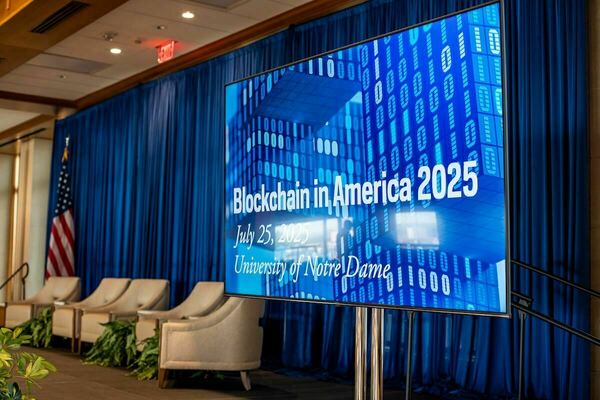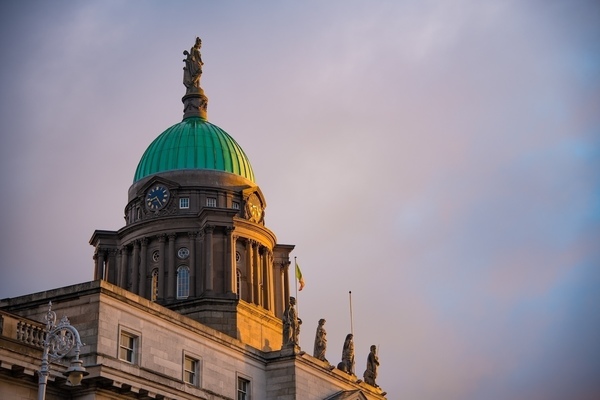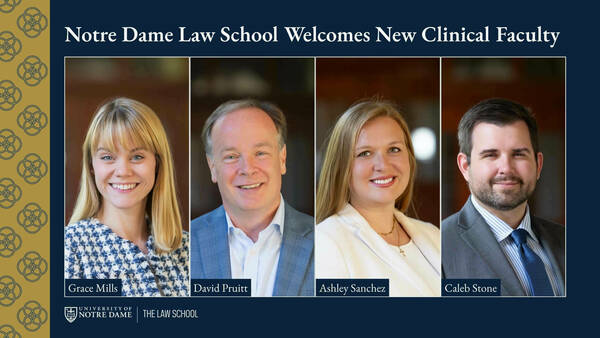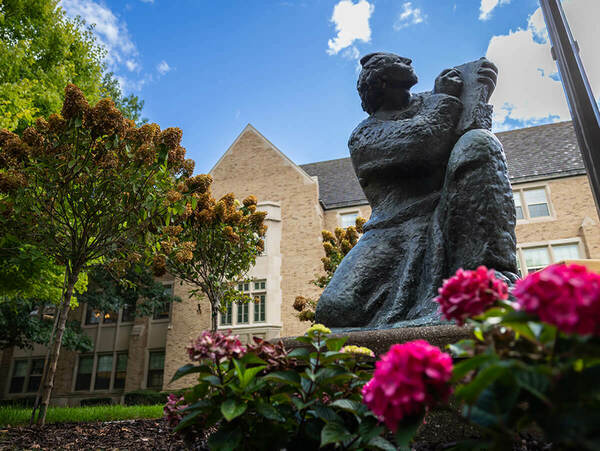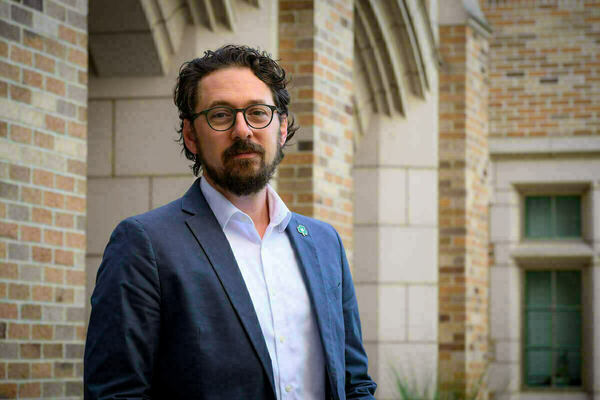Notre Dame builds bridges between blockchain researchers, policymakers, and industry with new flagship event series
Research leaders at the University of Notre Dame are convening policymakers, industry innovators, and the academic community to collaboratively solve challenges and realize opportunities related to blockchain technology.
On Friday, July 25, 2025, Jeffrey F. Rhoads, John and Catherine Martin Family Vice President for Research and professor in the Notre Dame’s Department of Aerospace and Mechanical Engineering, and Jarek Nabrzyski, founding director and professor of practice at Notre Dame’s Center for Research Computing, welcomed more than 60 thought leaders to campus to kick off “Blockchain in America 2025: Architects of Trust at the Intersection of Technology, Policy, and Law.” The closed-door convening is a launching point for a broader dialogue series that will span from Notre Dame’s main campus to Washington, DC, and explore the policy formulation, technological innovation, and strategic implementation necessary to unlock the full potential of blockchain technology, especially as it relates to critical national priorities.

“Blockchain creates real opportunities for bipartisan collaboration,” said Nabrzyski. “There is a huge role for us as a research community to collaborate with policymakers from both sides of the aisle. Supply chain integrity, data security, digital identity, and the infrastructure underpinning it are examples of the areas wherein we can work together.”
Blockchain technology — recognized for its transformative potential in enhancing transparency, efficiency, and trust — can be leveraged to keep information secure and verifiable in an uneditable state, with significant impacts across critical sectors such as finance, supply chain management, and national security. The links of secured information are stored on computer servers that make up a chain of blocks, or blockchain, that are verified by everyone connected to the system. These shared ledgers with immutable, or unchangeable, information are a way to carry verified value throughout a secured system. This technology can be applied to cryptocurrencies and economic stabilizers, as well as areas used in national security such as in verifying the origin points of semiconductors and parts made for defense vehicles.
The invitation-only event began with a pre-recorded conversation with Indiana Senator Todd Young, who highlighted the importance of collaboration between policymakers, industry, and academia in realizing the full potential of critical technologies such as blockchain.
“In recent years, emerging technologies have been an area of bipartisan collaboration,” said Young. “People recognize — Republican, Democrat, Independent alike — that blockchain can fundamentally transform our economy and our way of life in positive ways. They understand there are national security implications to the United States showing leadership in the area and maintaining that leadership.”
Additional speakers included startup founders and senior leaders representing venture capital firms, financial technology, and supply chain technologists from across the country who are driving innovation in blockchain technology and policy. The presentations focused on strategically growing the use and security of cryptocurrencies and decentralized finance (DeFi) as an economic opportunity and innovative security solution to address supply chain challenges. A common theme was the need for more research and development to understand the full scope and scale of the potential of blockchain.

“Universities play a key role in the global innovation ecosystem, and serve as prime locations to convene leaders from multiple sectors to discuss the hardest problems of today and work together to develop effective solutions,” said Rhoads. “Notre Dame is an ideal venue to discuss not only the technical issues, but also the legal and ethical aspects, so that we can ensure we are developing and deploying new technologies responsibly and effectively.” He added, “In order to face the challenges of tomorrow, we need all hands — industry, academia, and government — on deck.”
While terms like “blockchain” and “crypto” may have entered the general lexicon a few years ago, the field is still early in its development. Many in industry positions encouraged researchers and students in academia to pursue more knowledge and skills in business and computer science that can be put to use in AI, decentralized finance and cryptocurrencies, and blockchain technologies.
The kick-off event, hosted in South Bend, will now inform the development of a policy-focused dialogue, to be hosted at the Notre Dame Washington Office later in the fall semester. The organizers aim to again bring Notre Dame’s top research talent and leading industry voices to the policymakers and representatives shaping the United States’ role in developing strong initiatives around blockchain and cryptocurrency development and regulation.
To learn more about Blockchain research at Notre Dame and the new event series, please visit the Blockchain Research Group webpage.
Contact
Christina Clark / Research Communications Specialist
Notre Dame Research / University of Notre Dame
cclark26@nd.edu
About Notre Dame Research
The University of Notre Dame is a private research and teaching university inspired by its Catholic mission. Located in South Bend, Indiana, its researchers are advancing human understanding through research, scholarship, education, and creative endeavor in order to be a repository for knowledge and a powerful means for doing good in the world. For more information, please see NDR's website or NDR's LinkedIn.
Latest Research
- ND research teams awarded funding to address sustainability challenges around the worldNotre Dame's Just Transformations to Sustainability Initiative has awarded funding to three cross-disciplinary faculty teams leading research on pressing sustainability issues—including forest conservation in the Amazon, watershed…
- Fighting to improve hurricane forecastsResearchers at Notre Dame are improving hurricane forecast accuracy, giving officials time to evacuate and protect residents. Read the article
- 2025 Naughton Fellowships awarded to four joint faculty projectsThe University of Notre Dame’s Naughton Fellowship program has announced its faculty awardees for the 2025-2026 cohort. Faculty from leading Irish universities and Notre Dame have come together to work on four research projects as a part of the Naughton Faculty…
- Notre Dame Law School Welcomes Four New Clinical Faculty Members for 2025–26Notre Dame Law School is pleased to welcome four new clinical faculty members for the 2025–26 academic year. “It is an honor to welcome such a distinguished group of clinical professors to Notre Dame Law School. Their impressive achievements and deep sense of vocation will enrich our academic…
- Six early-career scholars join the inaugural Provost’s Postdoctoral Fellowship Program.Six interdisciplinary scholars have joined the College of Arts & Letters at the University of Notre Dame to continue their research, obtain invaluable support, and engage in professional development as part of the inaugural Provost’s…
- Politics inspired Democracy Initiative managing director from early ageThis is the first in a series of features highlighting the managing directors of the University's strategic initiatives. The managing directors are key (senior) staff members who work directly with the faculty directors to help implement and operationalize the vision for the initiatives, oversee initiative staff, and serve as thought partners for the faculty directors.



